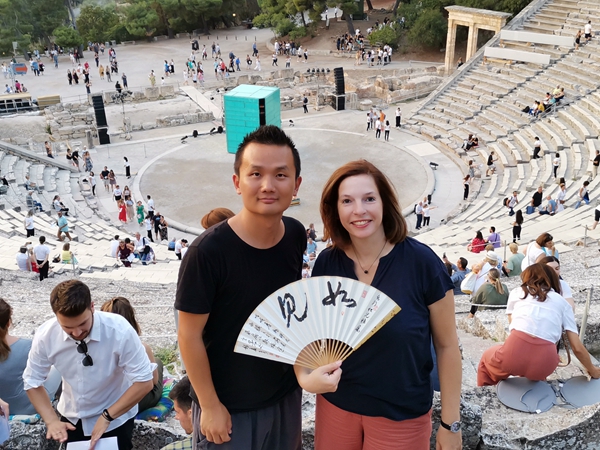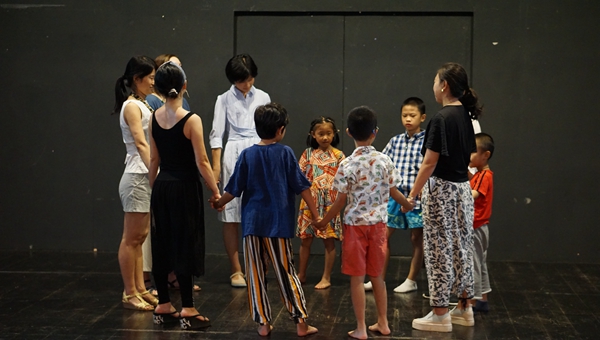Making drama out of a holiday
The stage was set and history provided a stunning backdrop as Chinese children mastered the intricacies of Greek theater at a recent summer camp, the first venture of its kind between the two countries.
Children perform in the birthplace of Greek theater and unleash their creativity.
The stage was set and history provided a stunning backdrop as Chinese children mastered the intricacies of Greek theater at a recent summer camp, the first venture of its kind between the two countries.

The seven-day program, held this month in the southern Peloponnese region, involved half a dozen "actors "aged between 8 and 15 from Shenzhen and Chengdu. They attended Greek theater classes and performed in workshops, learned about Greek music, history and mythology in lectures and visited historic sites as well as local theaters.
Two highlights marked their journey to the cradle of Western civilization. The group staged their version of the Greek drama, The Birds, by ancient playwright Aristophanes, at the Trianon Theatre in Nafplio. And, after they visited the Archaeological Museum of Nafplio, they performed a self-scripted 15-minute drama on the grand stage of the Ancient Theatre of Epidaurus. This venue, constructed at the end of the 4th century BC, is famed for its acoustics and aesthetics and is normally only open to professional performers.
Greek theater, dating back about 3,000 years, has had a profound influence on Western drama. "However, Greek drama is still a novel concept to many Chinese people, who are more familiar with Shakespeare's plays," says Miao Bin, founder of the Muse Academy, one of the organizers of the summer camp. "When Chinese think of Greece, as far as I know, they may be more familiar with its mythology or philosophy, rather than drama."
Other organizers of the trip were Study in Greece, a nonprofit organization under the Greek education authorities targeting international students, and the Theater Studies Department of the University of the Peloponnese.
"The program aims to introduce Greek theater to Chinese people by inviting them to an on-site experience, and it turned out to be a success," Miao says.
The young participants are still excited about their experience, he says. One of them is Peng Zixuan, 10, who has been learning drama at an institute in Shenzhen, Guangdong province.
"It is fun! I can devote myself to playing the role of someone else," Zixuan says, adding that he felt no difficulty studying at the summer classes. An added bonus was the cuisine, especially "the dry bread and salad with feta cheese at dinner".
Zixuan's mother, Huang Lihua, also a theater fan, says the event aroused Zixuan's passion for drama, and spurred his interest in ancient Greek civilization.
"Sometimes he became anxious if he couldn't express himself well in English or his lines were too short," Huang recalls of her son's experience at the summer camp.
"I told him that nobody is supposed to be the main character all the time and it needs teamwork to finish a play."

Huang adds that the event was more about playing games, discussions and brainstorming. For example, when preparing for the performance of The Birds, a comedy dating back to 414 BC, both the children and the four participating parents worked on the lines and choreography. They not only performed, but also promoted the play by painting posters and distributing them to passers-by on the street.
In the performance, humans grow discontented and seek to build an ideal new homeland with the birds. Out of fear and distrust, the birds refuse at first, but eventually an accommodation is reached, and they begin a new life together sharing their most precious goods. The play tries to convey the idea of environmental protection and building a harmonious relationship between humans and nature. Indeed, modern day critics suggest it was one of the first plays to highlight environmental issues.
Education authorities in Greece have put the play on the school curriculum.
In the play performed by the visitors, the children played birds and the parents played the humans.
Wen Haoyu, 10, says he both liked and disliked the role of a bird.
"I liked it because I can be the lead actor again. However, I disliked that the birds were mean by spitting at the humans and refusing to cooperate with them, even though the humans promised not to steal their eggs or hunt them," he says.
Haoyu adds that he used to feel nervous talking to people, but overcame his fears. "It's challenging because everybody looks at you on stage."
His mother, Zhou Lianhong, says it really surprised her that he exceeded himself by approaching strangers on the street to encourage them to watch the play with his limited grasp of English, and he got a dozen people to turn up.
"I think it's more meaningful than a classroom education," she says.
Haoyu learned much about himself and his emotions, even before performing. Initially, he had no lines to say. He managed to keep his emotions in check, but lost his temper with his younger brother, also a participant, just 30 minutes before the play started. His mother suggested that he should tell the group about his frustration. He did, and was given lines to recite.
One of the functions of learning theater, Zhou says, is to help express oneself in multiple ways-facial expressions, eye contact, body movements and words.
Maria Mikedaki, a teacher at the summer camp, who's assistant professor at the University of the Peloponnese, says she was impressed by the Chinese students' level of knowledge about Greek mythology, English language and their ability to distinguish between tragedy, comedy and satyr (similar to burlesque) plays, three key genres of Greek drama.
Greek drama is universal, says Mikedaki. "It does not refer only to Greeks but to the concerns of everyone on Earth," she explains. "It applies to communal problems of today and deals with the big themes of love, pride, the abuse of power and the conflicts between man and god, children and parents, good and evil."
Miao says the program has received solid support from the local government and educational institutes. Athanassios Katsis, rector of the University of the Peloponnese, says this summer camp has successfully connected the Chinese students with the cultural heritage of Greece.
"The goal is to promote these endeavors and formulate an institutional pathway in order for these actions to take place on a regular basis," says Katsis, who hopes to see more educational and cultural exchanges between the two countries.
Christos Michalakelis, president of Study in Greece, says the two countries, among the oldest civilizations on Earth, have a lot in common, and the program was well-designed to provide an experiential way of learning.
Euthymios Athanasiadis, press and communication counselor at the embassy of Greece in Beijing, says the event hints at the growth for educational tourism.
"Educational tourism, as a form of thematic tourism for young Chinese, has a great potential in Greece," he says, and hopes to see more Chinese children visiting the country to experience all its facets, such as art, math, science, dance and sports.
The organizers are planning a winter drama school for children by the end of this year. More activities, including Sino-Greek concerts, drama performances and related educational events are on the way.

